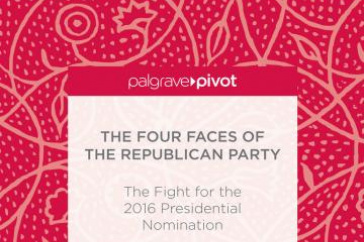UNH Political Expert Explores Many Faces of Republican Party in New Book

A new book co-authored by University of New Hampshire political expert Dante Scala and Henry Olsen, a senior fellow at the Ethics and Public Policy Center, The Four Faces of the Republican Party is available now
DURHAM, N.H. - A new book co-authored by University of New Hampshire political expert Dante Scala examines four factions of the Republican Party and how they can influence the presidential nomination process. It clearly defines the four different groups and helps readers better comprehend the election process, as well as how it can unfold in a predictable manner. The Four Faces of the Republican Party is available now.
Scala is poised to write about the Republican presidential nomination process from his vantage point as an associate political science professor at UNH and a fellow at the Carsey School of Public Policy. As a national expert on presidential primary politics, Scala regularly provides commentary for national and regional news media. His other areas of expertise include the New Hampshire primary, American campaigns and elections, state and local government, American political development and politics, in general. His current work includes a study of campaign finance in the era of super PACs.
Scala, and his co-author Henry Olsen, a senior fellow at the Ethics and Public Policy Center, set out to write a book that would be essential for anyone interested in understanding, reporting on, or influencing the Republican presidential election. They argue that there are more nuances to the GOP beyond the "establishment" versus the "outsiders". More factors typically come into play than are usually highlighted in the media and so-called conventional wisdom. For example, the authors explore why a Conservative Party always nominates a candidate favored by the party's establishment and why evangelical conservatives always emerge as one of the two final contenders for the nomination.
"It's actually a much more complicated dance to become the nominee," said Scala. "Because the nomination process is often misunderstood, we wanted to put together a detailed and comprehensive profile of Republican Primary voters, on a national and state by state basis, so the reader can follow along and be engaged throughout the election."
The authors used a wealth of data obtained from exit polls that looked at public opinion from elections as far back as 2000. Through those surveys they were able to profile four factions of the Republican Party: moderates and liberals; somewhat conservative voters; very conservative evangelicals; and very conservative seculars.
Traditionally, experts focus on momentum and elite influence as key factors in determining nominations but the authors argue that it's important to understand each of the Republican
Party factions and how they interact. "Candidates will first aim to champion the faction where they have similar values," says Scala. "Later in the campaign the focus becomes more about reaching out to other factions and building coalitions."
In the final chapter, Scala and Olsen look ahead to the 2016 election and provide analysis of other key factors like messaging and momentum. They provide the reader with insight into the probabilities of which scenarios are the most likely to occur and how a winner is likely to emerge.
The University of New Hampshire, founded in 1866, is a world-class public research university with the feel of a New England liberal arts college. A land, sea, and space-grant university, UNH is the state's flagship public institution, enrolling 13,000 undergraduate and 2,500 graduate students.
Image to be downloaded:
/unhtoday/news/releases/2015/12/images/img-89781137577535.jpg
A new book co-authored by University of New Hampshire political expert Dante Scala and Henry Olsen, a senior fellow at the Ethics and Public Policy Center, The Four Faces of the Republican Party is available now.
Latest News
-
October 30, 2024
-
October 10, 2024
-
October 8, 2024
-
October 3, 2024
-
October 1, 2024
















































